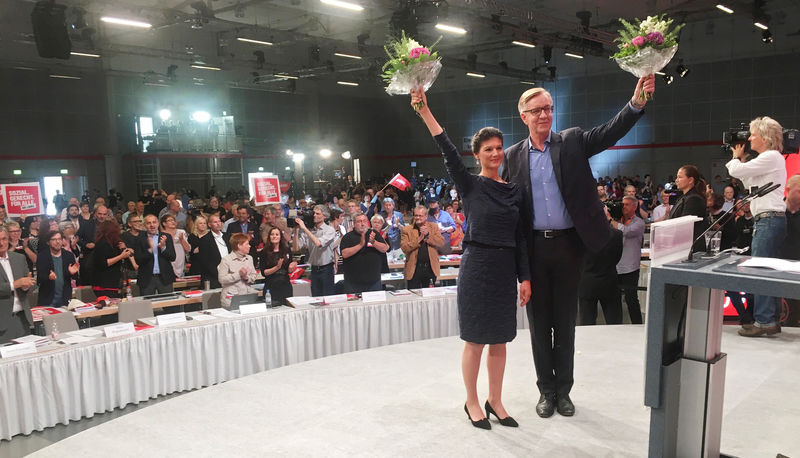By Michelle Martin
HANOVER, Germany (Reuters) - After Jeremy Corbyn's Labour Party scored surprise gains in Britain's election with an unashamedly left-wing program, the far-left Linke hopes to make progress with a similar agenda when Germans vote in September.
With the mainstream left Social Democrats (SPD) part of a grand coalition with Angela Merkel's conservatives, the Linke is currently Germany's biggest opposition party and is on 8-11 percent in the latest polls.
The party is hoping for a Corbyn-style surge to help boost its share of the vote and make it a potential player in an alternative coalition after the national election on Sept. 24.
Party co-leader Katja Kipping told Reuters she was encouraged by Corbyn's "magnificent catch-up race" after he entered the campaign far behind the Conservatives, especially as his ideas such as redistributing wealth mirrored Linke themes.
"He showed you can score a lot of points with a modern election campaign, doorstep visits and a social program that's very similar to ours," the 39-year-old said in an interview at a party congress in the northern city of Hanover.
Corbyn, whose party denied the Conservatives an outright victory, struck a chord with young voters and made clever use of social media in a campaign that had echoes of Democrat Bernie Sanders' bid to run for the U.S. presidency last year.
Linke co-chairman Bernd Riexinger, a 61-year-old former trade union leader, whipped up around 580 delegates with a speech saying Corbyn showed the unexpected could happen despite polls showing Merkel as the clear favorite to win another term.
"The election isn't over yet unless we believe the prophets who say so. Merkel and her politics can be ousted!" he said to thunderous applause at a conference taking place under the slogan "Social. Fair. For Everyone".
TROUBLED RELATIONSHIP WITH SPD
The Linke, which campaigns for wealth to be redistributed, wants NATO replaced with a new body including Russia and opposes German military combat missions, is aiming for at least 10 percent of the vote.
But Manfred Guellner, head of Forsa polling institute, said its support had leveled off at around 8 percent and "its potential is not much bigger than that".
An anti-Communist tradition in post-war western Germany makes it hard for the Linke -- formed in 2007 from SPD defectors and the successor party to East Germany's Communists -- to gain ground in the West. Older people nostalgic for the Communist days in East Germany are dying out, Guellner said.
With Merkel still popular and the German economy faring well, voters are likely to be reluctant to support the Linke and its social justice message - a problem also faced by the SPD, which has slumped in recent polls, he added.
The Linke is dependent on the SPD, with which it has a troubled relationship, if it wants to get into power.
The SPD has not ruled out a three-way alliance also involving the Greens, a change from 2013 when the constellation was mathematically possible but the political will was absent.
Kipping urged the Linke not to limit itself to being in opposition, which some members favor.
The party takes reassurance from the interest shown by young voters in left-wing policies. It says it has gained 3,000 new members this year and of those 58 percent are under age 35.
"That's not comparable with Sanders and Corbyn but it is at least a small plant that we should water," Dietmar Bartsch, a 59-year-old economist from the former Communist East who is one of the Linke's two lead candidates, said in an interview.
Sahra Wagenknecht, the party's 47-year-old firebrand co-lead candidate, said a sharp rise in support for the SPD earlier this year when it began focusing on social justice under new leader Martin Schulz showed people wanted a change in policy but Schulz's proposals had since disappointed his supporters.
She told Reuters the Linke plans to win young voters over by launching a "very rebellious campaign".
But Thomas Jaeger, a political scientist at Cologne University, said it was hard to see the Linke enjoying the same success as Corbyn, France's Jean-Luc Melenchon or Sanders as it does not have a charismatic figurehead.
Linke members shrug off the skeptics.

"We shouldn't let people who try to tell us it's unrealistic drive us crazy," said Bartsch.